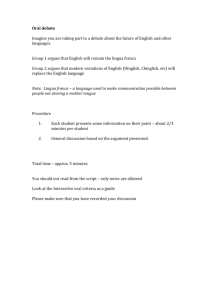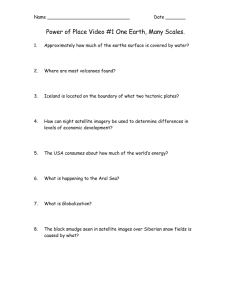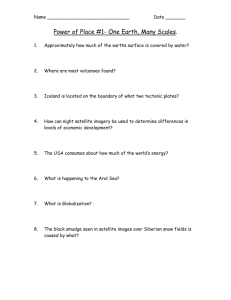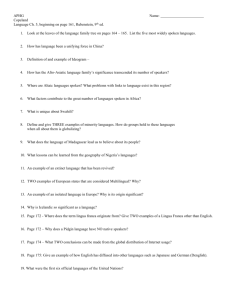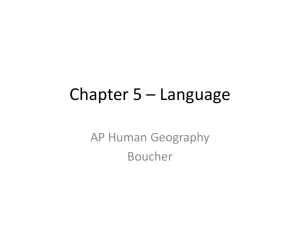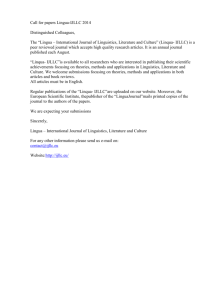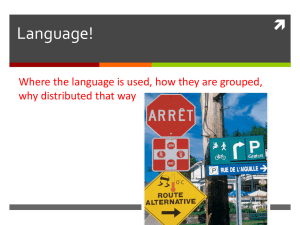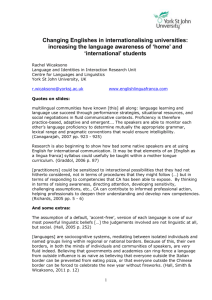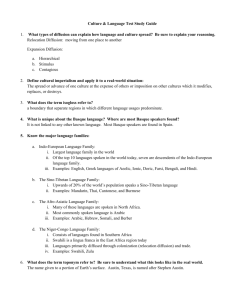TIS_Wicaksono - Higher Education Academy
advertisement
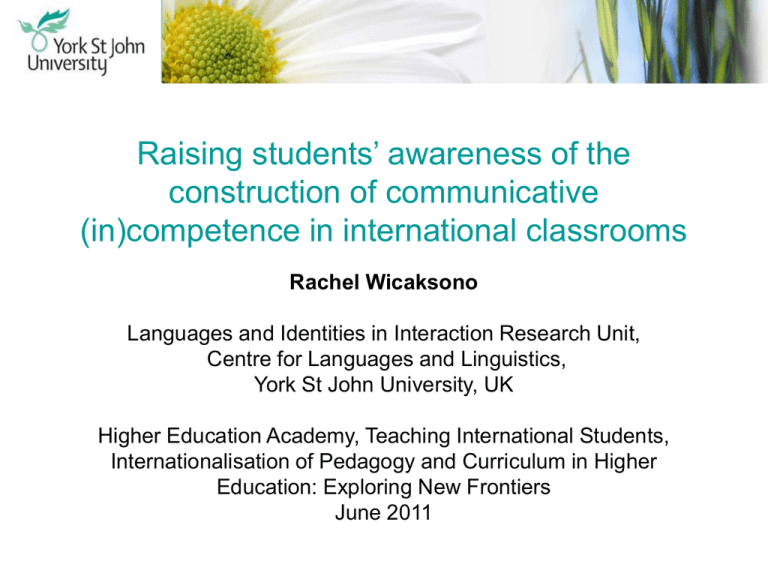
Raising students’ awareness of the construction of communicative (in)competence in international classrooms Rachel Wicaksono Languages and Identities in Interaction Research Unit, Centre for Languages and Linguistics, York St John University, UK Higher Education Academy, Teaching International Students, Internationalisation of Pedagogy and Curriculum in Higher Education: Exploring New Frontiers June 2011 Thinking about English language1 Thinking about English language 1 That there are now several centers of power that compete in promoting several native models of English and market distinct [English language teaching] methodologies cannot be denied. The motivation is clearly the exploitation of the economic power of English, as is obvious from the following quote: "As the director of a dynamic worldwide chain of English language schools puts it, 'Once we used to send gunboats and diplomats abroad; now we are sending English teachers'" (Phillipson, 1992 p. 8). Thinking about English language 2 The assumption of a default, ‘accent-free’, version of each language is one of our most powerful linguistic beliefs […] the judgements involved are not linguistic at all, but social. (Hall, 2005 p. 252) Thinking about English language 2 [languages] are sociocognitive systems, mediating between isolated individuals and named groups living within regional or national borders. Because of this, their own borders, in both the minds of individuals and communities of speakers, are very fluid indeed. Believing that governments and academies can ring-fence a language from outside influence is as naive as believing that everyone outside the Italian border can be prevented from eating pizza, or that everyone outside the Chinese border can be forced to celebrate the new year without fireworks. (Hall et al, 2011 p. 12) Thinking about English as a lingua franca multilingual communities have known [this] all along: language learning and language use succeed through performance strategies, situational resources, and social negotiations in fluid communicative contexts. Proficiency is therefore practice-based, adaptive and emergent…. The speakers are able to monitor each other’s language proficiency to determine mutually the appropriate grammar, lexical range and pragmatic conventions that would ensure intelligibility. (Canagarajah, 2007 pp. 923 - 925) Thinking about English as a lingua franca Research is also beginning to show how bad some native speakers are at using English for international communication. It may be that elements of an [English as a lingua franca] syllabus could usefully be taught within a mother tongue curriculum. (Graddol, 2006 p. 87) Extract 1 O: What- what parts of ummm like your lessons (.) have you enjoyed (.) doing (.) with Rachel. S: (2.0) Hmm? O: What parts of your ermmm ((LS)) (1.0) foundation programme have you enjoyed doing with Rachel. S: (.) We- I don’t have Rachel. O: Oh you do:n’t? oh right. So what- (1.0) what lessons d- what lessons are you doin’? Extract 2 C: (.h) err (1.9) which do you feel is most important when you learn English th- the writing and understanding of the language or the speaking and pronunciation which do you find (.h) you should (.) you: should err (.) err work more active? err (.) to be emm (1.2) so to grammatically understand the language or err (.) just so you can speak and get by the pronunciation which do you think is most important? M: en it depends on situation I think= Extract 3 B: So whilst you’ve been learning English what kind of things have you covered already ( .) what (.) areas have you covered whilst you’ve been here. G: (.) What do you mean? B: (.) (.h) Well, have you looked at (.) erm (.) travelling and directions °have you looked at° °°how to you know like how to°° °catch the bus. Have you looked at like in the supermarket° like buying and selling [food?] G: [yeah ] Creating (in)competence in interaction [repetition and re-phrasing, especially preventative] as [an] identifier of membership category may […] be labelled 'parasitic', in that its application draws upon negative stereotyping at the expense of the stereotyped, and to the benefit of the stereotyper, who has thus successfully legitimated his or her claim of being naturally endowed with more rights than her or his interlocutor. (Hinnenkamp, 1987 p. 173, emphasis in the original) Introducing English as a lingua franca: an online tutorial • Contents page • Background to ELF and our approach to the analysis of classroom talk • Transcribing • Notation http://www2.yorksj.ac.uk/EnquiryCommons/elf/elfsi te/index.htm Introducing English as a lingua franca: an online tutorial Discussing transcriptions: raising awareness, directing attention, developing sensitivity and challenging assumptions http://www2.yorksj.ac.uk/EnquiryCommons/ elf/elfsite/index.htm http://cw.routledge.com/textbooks/hall/ References Brown, G. (2008). English - The world's language. 2008 speeches. Available online at: http://www.pm.gov.uk/output/Page14289.asp [last accessed 4/4/11] Brutt-Griffler, J. (2002). World English: A study of its development. Clevedon, England: Multilingual Matters. Canagarajah, S. (2007). Lingua franca English, multilingual communities, and language acquisition. Modern Language Journal, 91, 923-939. Clark, H. H. (1997). Dogmas of understanding. Discourse Processes, 23, 567-598. Gardner, R. (2004). On delaying the answer: Question sequences extended after the question in (eds) Second Language Conversations. R. Gardner & J. Wagner. London: Continuum. Gargesh, R. (2006). South Asian Englishes. In B. B. Kachru, Y. Kachru & C. L. Nelson (eds) The handbook of world Englishes (Blackwell Handbooks in Linguistics). Oxford: Blackwell. Graddol, D. (2006). English next. British Council Learning. Available online at : http://www.britishcouncil.org/learning-research-english-next.pdf [last accessed 4/4/11] Gumperz, J. J. (1982). Discourse strategies. Cambridge: Cambridge University Press. Hall, C. J. (2005). An introduction to language and linguistics: Breaking the language spell. London: Continuum. Hall C. J., Smith, P.S, & Wicaksono, R. (2011). Mapping applied linguistics: A guide for students and practitioners. London and New York: Routledge. Hinnenkamp, V. (1987). Foreigner talk, code switching and the concept of trouble. In K. Knapp, W. Enniger, A. Knapp-Potthoff (eds) Analyzing intercultural communication. Berlin: Mouton de Gruyter. Park, J. (2007). Co-construction of nonnative speaker identity in cross-cultural interaction. Applied Linguistics, 28/3, 339-360. Phillipson, R, (1992). Linguistic imperialism. Oxford: Oxford University Press. Wicaksono, R. (2009). English as a lingua franca: an online tutorial. Available online at: http://www2.yorksj.ac.uk/enquirycommons/elf/ [last accessed on 5/4/11. Widdowson, H. G. (1994). The ownership of English. TESOL Quarterly, 28/2, 377-389. Back Back Back
